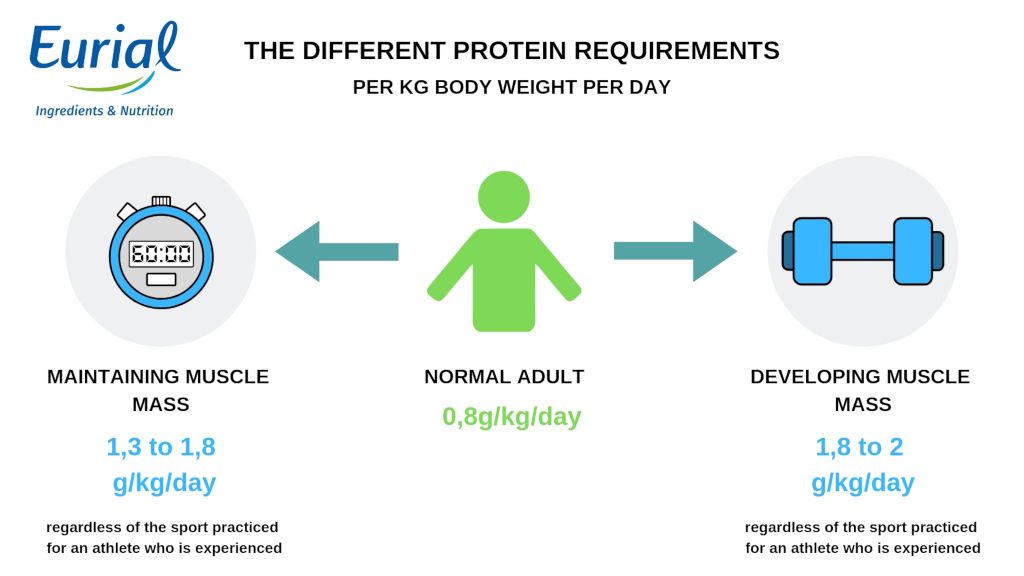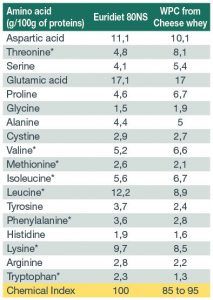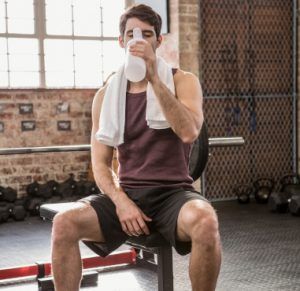
Regular physical exercise of any kind increases the need for dietary protein. Therefore, adjusting protein intake is crucial for athletes to:
- compensate for losses of amino acids following strenuous muscle exertion. The micro tears caused by exercise must be repaired for the muscle to rebuild. enable them to develop muscle mass.
- enable them to develop muscle mass.
More protein, but why?
The mechanism behind the increased protein requirement in athletesis linked to disturbance of muscle balance during physical exercise.
Increase or decrease in muscle mass is the result of changes to the balance between proteins that build and proteins that break down, in particular during exercise.
During physical exercise, all of the processes that break down muscle proteins become faster. At the same time, construction of muscle protein decreases. At the same time, construction of muscle protein decreases.

Once exercise has ended, the breakdown of muscle protein continues for a while, decreasing as it goes. However, importantly, the body begins to significantly rebuild muscle. During this crucial period, it is a good idea to have at your disposal the amino acids needed to rebuild muscle protein.
Did you know?
Amino acids are the building blocks of proteins,
Some are categorised asessential amino acids because our bodies cannot synthesise them and they must be obtained from our food.
Some essential amino acids are particularly relevant to sporting activity. These are the branched-chain amino acids or BCAAs. BCAAs (leucine, isoleucine, valine) represent 35% of the essential amino acids used to build muscle protein.
Among the BCAAs, leucine is particularly important in the stimulation of muscle protein synthesis.(Shimomura et al., 2004; Anthony et al., 2001; Rennie et al., 2006; Shimomura et al., 2006),
During the critical phase of recovery from exercise, it has been clearly demonstrated that the body must receive protein.
More protein, but how much?
The amount of protein needed by athletes is related to the intensity of the exercise performed. It is usually a little higher for activities such as bodybuilding than for endurance activities such as running, cycling or swimming.
Regardless of the sport, the required intake of protein to maintain muscle massis generally in the region of 1.3 to 1.8g/kg/day.

More protein, but which kind?
Regardless of the sport, protein intake is important, but so is taking proteins with excellent nutritional quality.
Milk and dairy products are currently of particular interest to sports nutritionists. They are a valuable source of protein because of their comprehensive contribution of essential amino acids, carbohydrates, lipids, vitamins and minerals relevant to sporting activity.
Cow’s milk contains two categories of protein that are beneficial for sport:
- Slow-digesting proteins, such as caseins are effective forrebuilding muscle.
- Fast-digesting proteins, such as whey proteins are beneficial for gaining muscle mass when combined with intakes of energy.
Eurial Ingredients & Nutrition solution
In the EuriNutri™ range, EuriNutri™ 80 NS and EuriNutri™ 80 NS Instant are a source of fast milk proteins that are particularly rich in leucine.
Producing Native WPC80 in the EuriNutri™ range directly from milkrather than from whey allows us to obtain a very specific amino acid profile. It isfree from the GMP (glycomacropeptide) released during cheese-making which generally reduces the nutritional value of whey protein. As such, EuriNutri™ 80 NS has on average 16% more leucine than traditional whey protein concentrates (WPC) derived from cheese-making.

Profile comparison of amino acids: WPC80 derived from cheese making and Native WPC80 (derived from milk)


